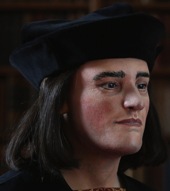A few items discovered in my never-ending task of trying to relieve my bookcases of excess material (96% of those selected to be discarded always return home).
In a copy of No Turn Unstoned * by Diana Rigg (a wonderful actor mainly remembered for her leather-clad Emma Peel in television’s “The Avengers”) she compiled a collection of awful theatrical reviews and among them:
Ian Holm in The Wars of the Roses. Shakespeare’s Richard III, Stratford- on -Avon, July 1963. Reviewed by The Times.
Mr Holm still presents Gloucester as a likeable juvenile, open-faced and friendly in spite of his hump and surgical boot. Mr Holm’s reading …fails totally to develop in Satantic magnitude. Instead of the boar, the bottled spider or the bunchbacked toad, Mr Holm remains a high-spirited minor; he exhausts his lung power in the later scenes, but finishes up on Bosworth Field loaded down with an armour of medieval weapons crooning to himself like a baby inside his visor.
Alan Howard in Shakespeare’s Richard II, Aldwych, November l981. Reviewed by Robert Cushman in the Observer.
Almost my first impression at Tuesday’s premiere of Richard II was of Alan Howard in the title role addressing his uncle Gaunt as “old John of York, time-honoured Lancaster”, a dynastic confusion that if spotted in time might have prevented the Wars of the Roses.
Richard III, by Shakespeare, performed by Theatre Productions Inc, March 1943. Reviewed by George Jean Nathan.
To the multiplicity of the play’s murders, Mr Coulouris and his company added another: that of the play itself. Under the species of acting which they visited upon it, Shakespeare’s tragedy was for the most part transformed into something vaguely resembling Dr Jekyll and Mr Hyde, without Jekyll.
(At least Mr Nathan admits that the story of Richard III is a tragedy and not a history.)
Richard III by Shakespeare, directed by Colin George, Old Vic, March 1962. Reviewed by Bernard Levin in the Daily Express.
There is a learned man at present trying to discover whether dolphins can talk. When he has finished this study, he might consider investigating whether producers can think. On the evidence of this disastrous production … it seems unlikely.
Let’s hope for more additions to these comments. Most productions of Shakespeare’s Richard III I have seen have been memorable for all the right reasons and, being proudly Australian, I include all those by the Bell Shakespeare Company, especially The Wars of the Roses in 2005, the remembrance of which still thrills me. But there have been some horrors by companies best left unnamed, such as one where Richard was far too old and heading the queue to receive a Senior Citizens card; and another where all the lovely ladies in the cast had had their hair “done” in the morning and wore their medieval headdresses at angles that would not interfere with the “do”. I’m sure they looked fabulous at the after party in the local club.
*No Turn Unstoned: The Worst Ever Theatrical Reviews, compiled by Diana Rigg, published by Elm Tree Books London in 1982. ISBN 0-241-10855-1 (There is a Wikipedia entry on this book: http://en.wikipedia.org/wiki/No_Turn_Unstoned)
Tags: Shakespeare

Leave a reply